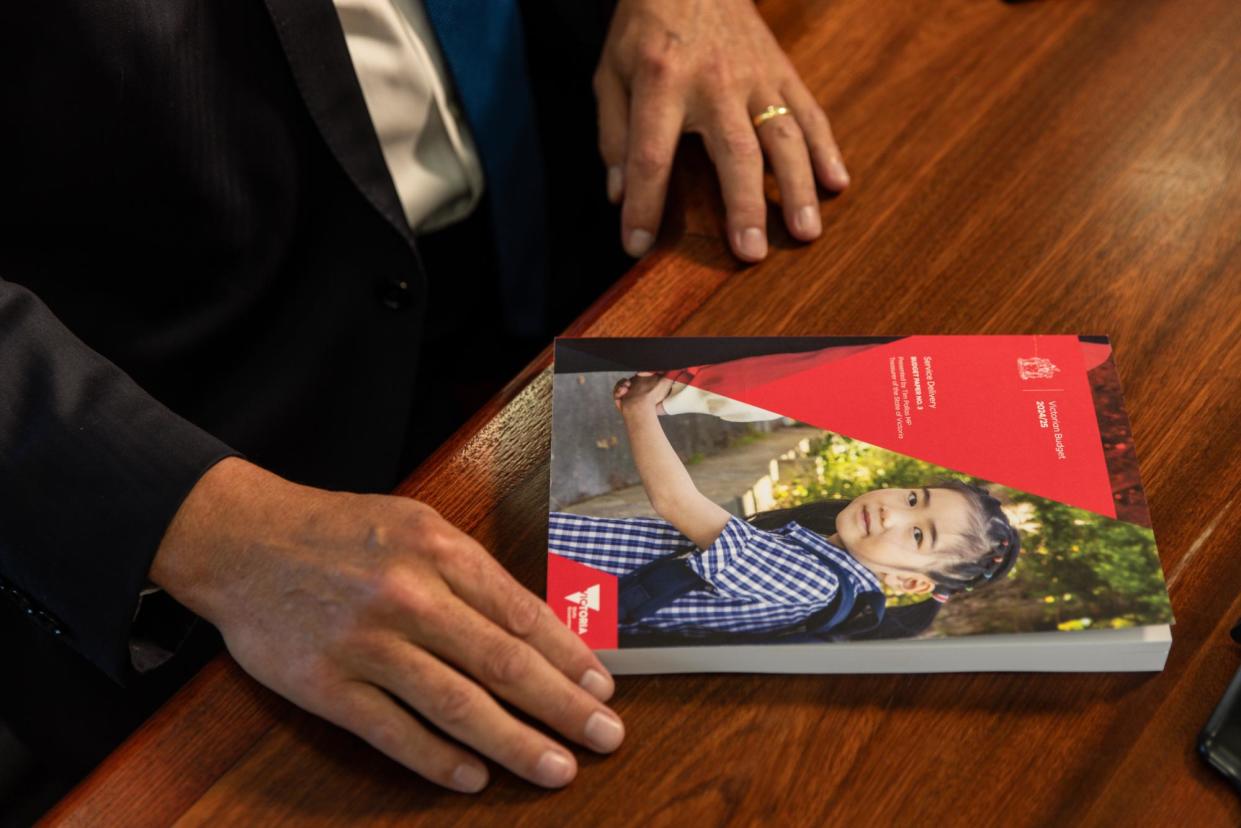Victoria state budget 2024 winners and losers: $400 for school students, home buyer fund boost and increased levies

The Victorian treasurer, Tim Pallas, says “sensible and disciplined decisions” have been made in the state budget – including delaying Melbourne’s long-awaited airport-rail link and scrapping Covid-era measures such as sick pay for casual workers – in an effort to keep debt under control.
But in recognition of cost-of-living pressures, the government has also introduced some relief measures for families to soften the blow, including one-off payments for public school students and an expansion of its shared-equity home ownership scheme.
Here’s a breakdown of the winners and losers in Victoria’s 2024 budget:
Winners
Families
The centrepiece of the government’s cost-of-living relief is a one-off $400 payment for Victorian public school students. Under the $287m package, parents will be free to choose how they spend the payment on education-related expenses like uniforms, school camps and excursions.
All government school students and eligible concession card holders at other schools will receive the payment. The payments – to be administered by schools – will be available from term one next year.
The government will also triple the size of its program offering free eye tests and glasses for public school students, with an injection of $6.8m. It estimates the Glasses for Kids program will assist an extra 74,000 prep to grade 3 students. It will also extend its $200 voucher program to support eligible Victorian students play sport, with a $6m investment in the next financial year.
Homebuyers
The government will invest $700m over the next financial year to expand its shared-equity home ownership scheme to help Victorians purchase a home. Under the expansion, the Victorian Homebuyer Fund’s price cap for regional homes will increase to $700,000 – up from $600,000.
It has also flagged it will transition to the federal government’s shared-equity scheme after the next financial year. It says it will provide “staggered monthly allocations” will ensure funding is available until the commonwealth scheme starts.
Healthcare
The government’s $11bn injection into the state’s healthcare system is described as Victoria’s largest single investment in the hospital sector. The funding is designed to help the sustainability of hospitals, as the cost of running the healthcare system continues to increase. This includes $813m to begin construction at the Northern hospital, including a new emergency department, and $535m to expand the Monash Medical Centre, including expanded maternity care facilities.
Women
The government will provide a further $21m in initiatives to help keep women and children safe, including intervention to prevent family violence, and assistance for survivors.
It has committed to introducing legislation requiring every future government to include a gender equality statement in each budget.
Losers
Melbourne airport rail
Victoria’s long-awaited airport rail line will be delayed for at least four years, with the government citing a dispute with Melbourne airport over compensation and the location of the station. The commonwealth and state governments each committed $5bn to the project, which stalled last year amid a federal infrastructure review. As the federal government has recently appointed a mediator to help resolve the dispute, the Victorian government says the estimated completion time and total investment is unknown. The government has forecast $1.32m for the next financial year for the project.
Infrastructure
Citing workforce shortages and inflation, the government has trimmed back its infrastructure investment. The budget shows an expected decline from a peak of $24bn this financial year for $15.6bn over the next three years. This will impact several infrastructure projects.
An election commitment to construct a new medical precinct, to deliver non-urgent treatment, near the new Arden train station has been scrapped. Pallas confirmed to reporters the 12-year plan, which was estimated to cost between $5bn and $6bn, will not be going ahead citing the “electromagnetic interference” from the nearby station.
He said the government was now looking to expand the Royal Melbourne and Royal Women’s hospitals at their remaining sites at Parkville, allocating $2.3bn to the work.
The completion date for the early works of the first section of the Suburban Rail Loop, running between Cheltenham and Box Hill, has been pushed back to early 2026, from mid-2025 predicted in last year’s budget.
Casual and contract workers
The government will end the Covid-era sick pay guarantee, which provided casual and contract workers up to 38 hours of sick or carer’s pay, in a bid to reap budget savings.
Landfill users
Victoria will increase its waste levy in line with New South Wales and South Australia. The state government will boost the metropolitan industrial and municipal waste levy to $167.9 a tonne from mid-2025, up from the current $129.27.
The levy will also be proportionally increased at rural landfills, which are lower than metropolitan areas.
The budget says the levy increases will help fund the Environment Protect Authority, Sustainability Victoria and Recycling Victoria to help disincentivise waste going to landfill. The government will also raise the fire services property levy from 1 July this year to help support the state’s fire services.
Kinder and mental health local hubs
The government will slow its rollout of the expansion of the free kindergarten program and the mental health and wellbeing local hubs – both key election commitments in 2022.
Ahead of the election, the government pledged to provide 15 hours of free three- and four-year-old kinder. Pallas said the rollout would occur more gradually across the state by 2036 rather than 2032. The expansion of four-year-old free kinder in Melbourne, Geelong, Ballarat and Bendigo, will consequently be pushed back a few years.
It is a similar story for the mental health and wellbeing of locals, which will still be delivered, but on a “longer time horizon”.

 Yahoo News
Yahoo News 
